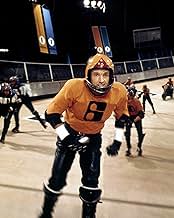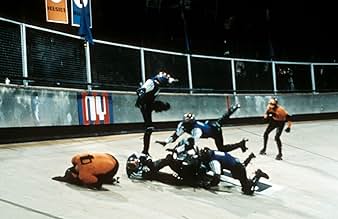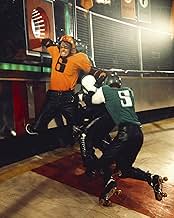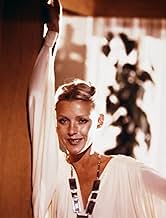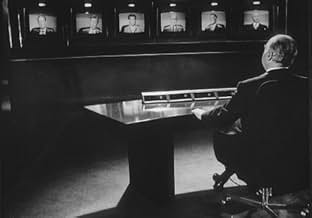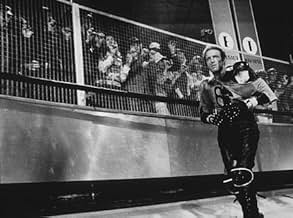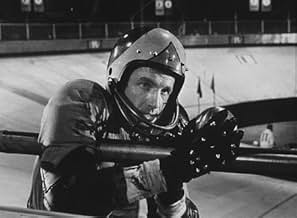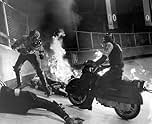In a corporate-controlled future, an ultra-violent sport known as Rollerball represents the world, and one of its powerful athletes is out to defy those who want him out of the game.In a corporate-controlled future, an ultra-violent sport known as Rollerball represents the world, and one of its powerful athletes is out to defy those who want him out of the game.In a corporate-controlled future, an ultra-violent sport known as Rollerball represents the world, and one of its powerful athletes is out to defy those who want him out of the game.
- Won 1 BAFTA Award
- 4 wins & 5 nominations total
- Bartholomew's Aide
- (as Rick Le Parmentier)
- Madrid Biker #1
- (uncredited)
- Houston Team Rookie
- (uncredited)
- Biker
- (uncredited)
Featured reviews
Now, having just watched the movie twice in a night, the second time with the director's commentary, I have finally got to grips with the scenes between the action, and discovered that I like it more than ever. The view of the future is not highly original; tipping its hat to the stratified societies foreseen by Orwell and Huxley, amongst others; but nevertheless the portrayal is engaging. Jewison astutely realised that only by filling in the image of the future society, the characters, and the political background against which the tournament unfolds, would the game be seen as truly REAL for the characters. In the meanwhile, he also has the chance to build suspense, upping the stakes for both the heroic gladiator/combateur Jonathon, and his would-be puppet master Bartholemew. In this way, when we come to watch the actual contests, our enthusiasm is whetted, and by making the rules progressively more dangerous with each passing game, the stakes grow ever higher.
The central themes of the movie are (i) loss-of-soul/nihilism/sensual-vs-spiritual-happiness, and (ii) individuality vs state control. Perhaps the best scenes elucidating these themes are the famous `tree killing' scene, and the conversation between Jonathon and Ella in the forest. The use of imagery and metaphor is widespread; I will mention only the terrific concept of the roulette wheel as game arena, with the players INSIDE, instead of outside; and the Circus Maximus parallel. You may draw many interesting conclusions from this about the director's and writer's intent.
My final word is: watch it once, soak up the action, and be bored by the rest. Then view it again, feel yourself in Jonathon's dilemma, experience his wrenching disappointment with the people in his life who betray him, and try to tear yourself away if you can as he is pushed inexorably to his fate in the arena of ROLLERBALL.
The film "Rollerball"(United Artists,1975),was screenplay by William Harrison and directed by Norman Jewison,who was Oscar nominated for his brilliant direction in such films,"In The Heat Of The Night",and the musical "Fiddler On The Roof",is no stranger to science fiction material. The film is set in the year 2018 where there are no wars and no crime,but there is only....the Game. In a world where corporations rule and no one asks questions-the vicious and barbaric sport of Rollerball satisfies the violent impulses of the masses. Tuned to their televisions,the people watch the sport of the future which is a brutal mutation of football,the Romanesque gladiator fighting,motorcross and hockey. Jonathan E.(played brilliantly by James Caan) is the champion Rollerball player-a man too good for his own good. The corporation has taken away the woman he loves(Maud Adams),but they won't take away his soul even if the diabolical corporate head(John Houseman)tells him he'd better retire..or suffer the old-fashioned way.
With some surrealistic imagery,Orwellian theme,and tense action with some of the best action sequences ever filmed,this picture will grip you from the moment the ball rolling out and zooms into the stadium to its chilling cilmax,this movie has haunted audiences as it takes a look into the future and what the future would become,and has a stunning effect. James Caan's performance is something to marvel at and John Houseman's performance as the diabolical corporate executive is a chilling and stalking cold and with some of the strong support from its cast including John Beck,Moses Gunn,and Ralph Richardson.
The 1975 version is worth seeing..it is the original and still the best of its genre...Don't even bother with the 2002 version with was directed by John McTiernan.
But, what am I trying to say?. Rollerball, folks, is one of the most perfect examples of the good/evil infinite fight. One man alone, discovering the truth behind is comfortable life, losing is goods and privileges, gets himself in a life-or-dead final battle against the real enemy: the Corporation (¿who else?). The image of James Caan skating alone into the game arena with the crowd claiming his name louder and louder is simply unforgettable. GREAT movie.
And remember: Take care, there are many powerful Corporations around you.
But in both films, we see the same powerful strategy: a complex, philosophical brain-twister beneath a deceptivly simple exterior. "Fiddler on the Roof" was seemingly a linear story about a struggling Jewish family's good & bad times. But the real meat of the story was about the conflict between old ways and new (tradition vs. progress). Here in "Rollerball" we have another seemingly linear story about an athlete in a violent, futuristic sport. But the real meat is the conflict of brutal human nature vs. suppression (again, a sort of "tradition vs. progress"). As with "Fiddler on the Roof", director Norm Jewison doesn't hit us over the head with any preachy sermon but instead leaves us to digest the situation.
"Rollerball" has the same powerful, brooding quality that we see in many of the 70s scifi masterpieces, like "THX 1138", "Soylent Green", "Planet of the Apes", "Blade Runner" (yeah I know that one was 1982), and the one that started them all, "2001: A Space Odyssey". Cold, sterile sets, disturbing situations and powerful use of silence characterize these films. By today's standards they might be considered slow, but depending on how you like your scifi, that might be right up your alley.
In a nutshell, the story is about a futuristic society that has largely done away with civilian violence. It has done this by "subsidizing" violence by way of a global pasttime: a hyper-violent sport called Rollerball. Note: as a parallel story, we learn that cut-throat corporate competition has been similarly squelched by the government creating monopolies. And thus society finds peace. Or does it? You can probably see the brilliant metaphors being woven here. This isn't an ordinary scifi romp, it's a powerful socio-political allegory. It cuts to the heart of human nature the way the great writers H.G. Welles, Mary Shelley and George Orwell did. No, you won't see a lot of laser battles, spaceships and aliens. But here you'll see an excellent example of what scifi was designed to do: comment on our current human condition by creating a fictional (extreme) scenario as a cautionary tale.
Excellent, and I mean EXCELLENT performances by James Caan (The Godfather, Misery), John Houseman (The Paper Chase, The Fog), Maud Adams (3 James Bond films), Moses Gunn (every 70s TV show from Hawaii 5-O to Shaft), and a particularly gripping performance by Pamela Hensley (Princess Ardala in "Buck Rogers" homina homina) make this an all-star powerhouse of 70s talent.
The music deserves a special mention of its own. From the opening notes of Bach's Toccata in Dm (the creepy "Dracula" theme) to Albinoni's haunting Adagio in Gm (check it out on YouTube... saddest song ever), "Rollerball" doesn't hold back.
They don't make 'em like this anymore. But there are a few modern scifi films that come close: "Moon", "District 9" and "Solaris" come to mind.
If you liked the films I mentioned in this review; if you liked the 70s classics "Catch-22" and "Coma" and "Stepford Wives"; if you like films that are both entertaining and works of art, do NOT miss Rollerball.
For laughs, after you watch Rollerball (1976), check out the remake done in 2002 ...and see how far we've come :/
Did you know
- TriviaMany of the extras in the film received an additional wage in order to cut their fashionably long hair so the look of the film would not be tied to the era in which it was made.
- GoofsAt the beginning of the New York game, after many moments in the film where different characters have repeated that there would have been "no time limit", the scoreboard shows the countdown (starting from 20.00).
This is not actually a goof, as the game was still going to have 20-minute periods, but there was going to be no limit to the number of periods, hence "no time limit".
- Quotes
Bartholomew: Sweet dreams, Moonpie. That's a bad habit you've got there. You know what that habit will make you dream, Moonpie? You'll dream you're an executive. You'll have your hands on all the controls, and you will wear a gray suit, and you will make decisions. But you know what, Moonpie? You know what those executives dream about out there behind their desks? They dream they're great Rollerballers. They dream they're Jonathan; they have muscles, they bash in faces.
- ConnectionsFeatured in Brubaker (1980)
- SoundtracksToccata and Fugue in D minor, BWV 565
(uncredited)
Composed by Johann Sebastian Bach
Performed by Simon Preston and the London Symphony Orchestra
Conducted by André Previn
Details
- Release date
- Countries of origin
- Language
- Also known as
- Rollerball: los gladiadores del futuro
- Filming locations
- BMW Building, Munich, Bavaria, Germany(Energy Corporation headquarters)
- Production companies
- See more company credits at IMDbPro
Box office
- Budget
- $6,000,000 (estimated)
- Runtime
- 2h 5m(125 min)
- Color
- Sound mix
- Aspect ratio
- 1.75 : 1



